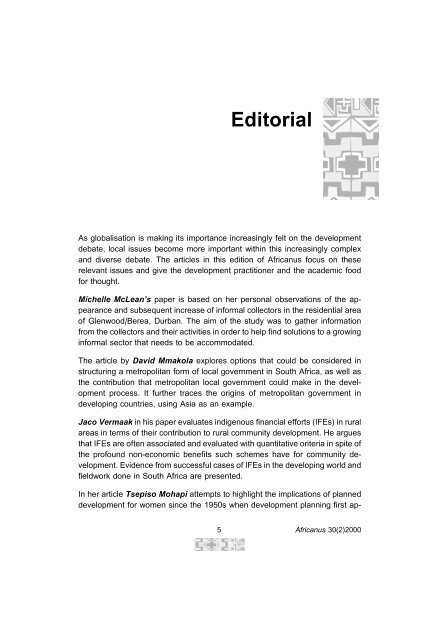AFRICANUS Vol 30 No 2 ISSN 0304-615X - University of South Africa
AFRICANUS Vol 30 No 2 ISSN 0304-615X - University of South Africa
AFRICANUS Vol 30 No 2 ISSN 0304-615X - University of South Africa
Create successful ePaper yourself
Turn your PDF publications into a flip-book with our unique Google optimized e-Paper software.
Editorial<br />
As globalisation is making its importance increasingly felt on the development<br />
debate, local issues become more important within this increasingly complex<br />
and diverse debate. The articles in this edition <strong>of</strong> <strong>Africa</strong>nus focus on these<br />
relevant issues and give the development practitioner and the academic food<br />
for thought.<br />
Michelle McLean's paper is based on her personal observations <strong>of</strong> the appearance<br />
and subsequent increase <strong>of</strong> informal collectors in the residential area<br />
<strong>of</strong> Glenwood/Berea, Durban. The aim <strong>of</strong> the study was to gather information<br />
from the collectors and their activities in order to help find solutions to a growing<br />
informal sector that needs to be accommodated.<br />
The article by David Mmakola explores options that could be considered in<br />
structuring a metropolitan form <strong>of</strong> local government in <strong>South</strong> <strong>Africa</strong>, as well as<br />
the contribution that metropolitan local government could make in the development<br />
process. It further traces the origins <strong>of</strong> metropolitan government in<br />
developing countries, using Asia as an example.<br />
Jaco Vermaak in his paper evaluates indigenous financial efforts (IFEs) in rural<br />
areas in terms <strong>of</strong> their contribution to rural community development. He argues<br />
that IFEs are <strong>of</strong>ten associated and evaluated with quantitative oriteria in spite <strong>of</strong><br />
the pr<strong>of</strong>ound non-economic benefits such schemes have for community development.<br />
Evidence from successful cases <strong>of</strong> IFEs in the developing world and<br />
fieldwork done in <strong>South</strong> <strong>Africa</strong> are presented.<br />
In her article Tsepiso Mohapi attempts to highlight the implications <strong>of</strong> planned<br />
development for women since the 1950s when development planning first ap-<br />
5 <strong>Africa</strong>nus <strong>30</strong>(2)2000
















